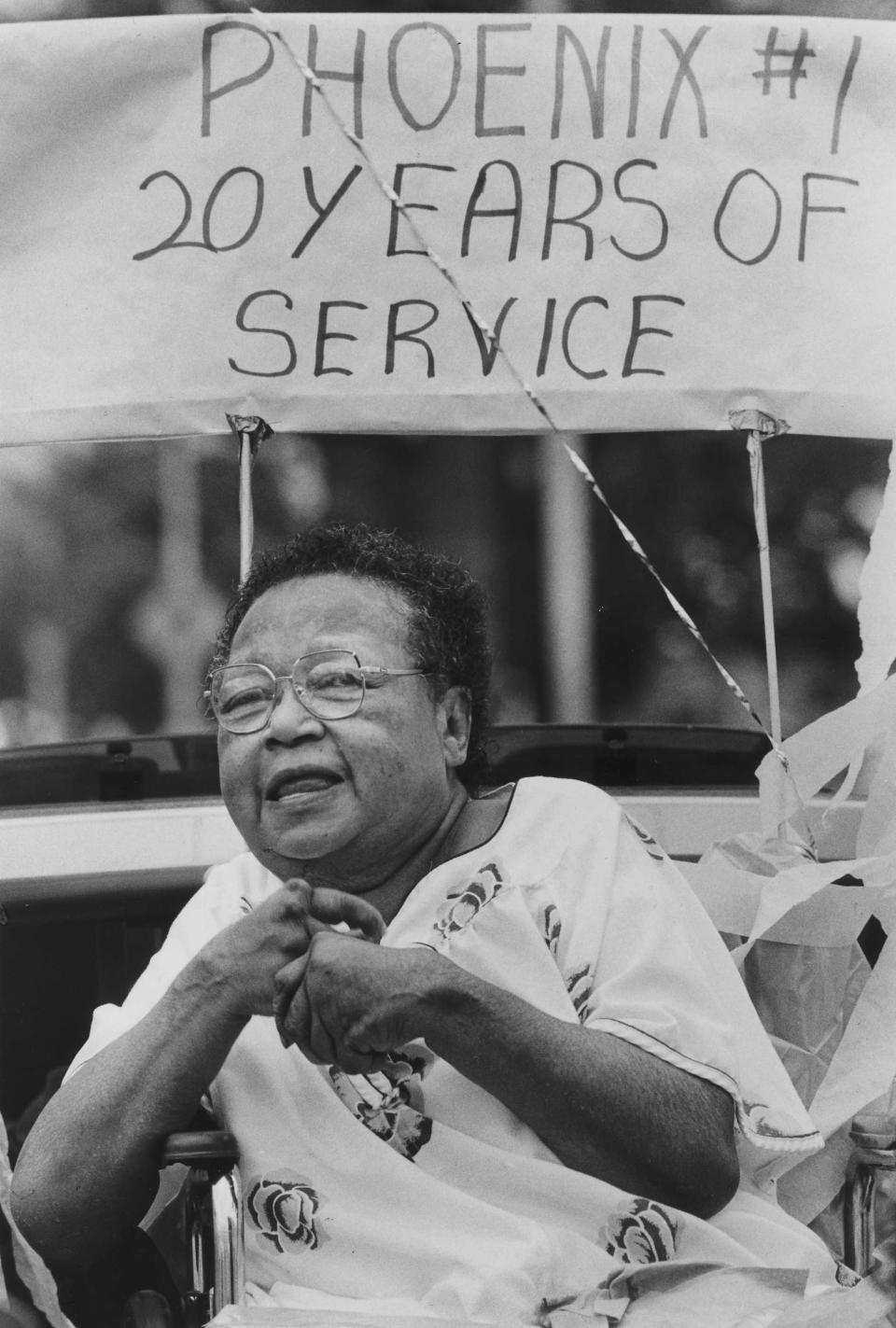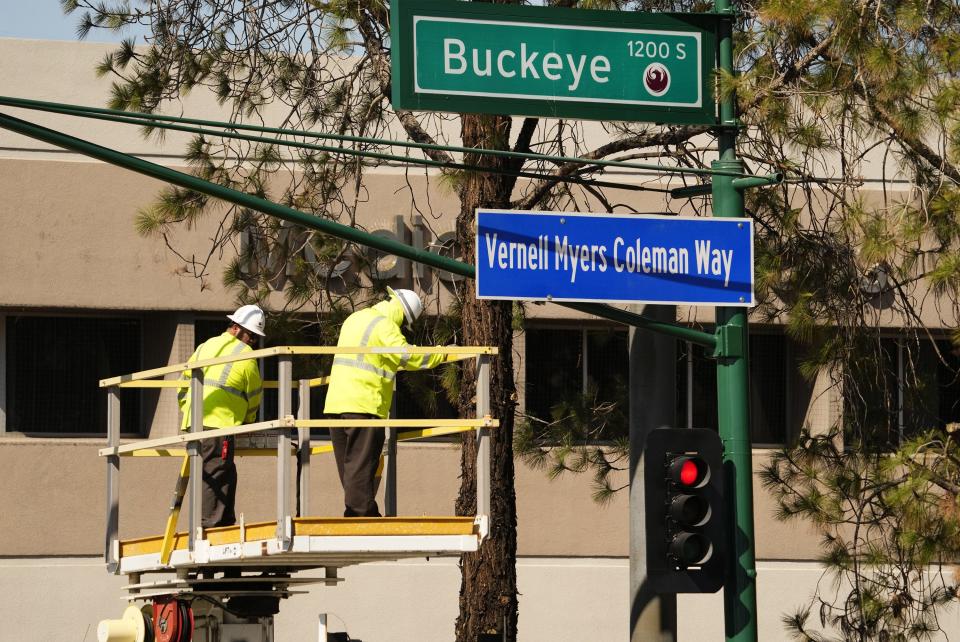Vernell Myers Coleman, who revived Juneteenth in Phoenix, celebrated with street signs
Community activist Vernell Myers Coleman, who spent her life helping people in poverty before she died, was celebrated Wednesday as city officials unveiled ceremonial street signs with her name at Seventh Avenue and Buckeye Road.
Coleman was a beloved community figure known for reviving the Juneteenth celebration in Phoenix, helping establish the St. Mary's Food Bank, and leading a rent strike at the Matthew Henson Housing Project to improve substandard living conditions for tenants during the 1960s. She cooked for her community, volunteered at her church and challenged powerful institutions to do more for the poor.
She told The Arizona Republic in 1981 at age 63, "I've never cared for riches. I've never cared for earthly things. I am looking for internal things."
Wednesday's unveiling, at the same intersection as the housing project where she spent most her life, marked exactly 34 years since Coleman's death. But the memory of "Mother Coleman," or "the mayor of the Matthew Henson," as her community called her, was as potent as ever.

"A born leader," "trailblazer" and "one of our pioneers," were just a few of the ways roughly a hundred community members remembered her. Former elected leaders, city officials and residents from Matthew Henson attended.
They called the event a "project reunion" and shared hugs and smiles. They reminisced over their favorite meals "Miss Coleman" cooked for them as children, how she made everyone feel at home, and always knew the right person to get problems fixed.
Her daughter, Charlesetta Coleman-Miller, said the ceremonial signs were "living proof that her living was not in vain," a reference to her mother's favorite spiritual. The crowd cheered.
Mayor Kate Gallego called the signs one of Phoenix's "highest honors." She said Phoenix, which declared Juneteenth a formal city holiday in 2022, probably wouldn't have done so had it not been for Coleman's revival of the celebration back in 1968.
"Vernell is particularly inspiring because it shows one person can make a huge amount of change on a city," Gallego said.
Coleman's daughter said the mayor came to her months ago with the idea for ceremonial signs. Coleman-Miller was stunned.

"Once a person dies, you think they're gone and people won't remember. (The mayor) being as young as she is and taking the time to find out about her and wanting to reward (my mother) for this just truly lets me know she is in tune with the community," Coleman-Miller said.
Councilmember Kesha Hodge Washington, the city's first Black woman on council and the representative of the area, said Coleman's legacy epitomized "servant leadership."
Coleman's history as a voice for the voiceless serves as a reminder today to ensure marginalized communities don't go overlooked at City Hall, Hodge Washington told The Republic.
Coleman's community service
Coleman first moved to Phoenix in 1938 to help her sister, Elizabeth Swain, who was ill.
She and her four children moved into the Matthew Henson Housing Project in 1953. Rheumatoid arthritis prevented her from securing work, but she cooked and ironed for community members to get by, Coleman-Miller said.
Attendees Wednesday boasted over how Coleman-Miller got more done with arthritis than most people get done without the condition.
The late activist was also an active member at First Institutional Baptist Church. She served on the Pastor's Aid Society fundraising for the church.

Coleman-Miller remembered hearing her mom call around to different department stores, seeking donations the church could later sell.
In the 1960s, she served as a commissioner for LEAP, a Phoenix city program dedicated to the Leadership and Education of the Advancement of People. She was also part of the Phoenix Urban League and the City of Phoenix Housing Advisory Board.
Her most notable work includes reviving Juneteenth celebrations and organizing a rent strike.
Living conditions at Matthew Henson Housing Project were substandard. The cooling systems didn't work, the sanitation was poor and trash collection shoddy, according to a list of complaints Coleman drafted at the time.
Residents also said Phoenix Housing Authority officials were prejudiced against Africans Americans, segregated the housing complex and didn't communicate effectively.
Coleman created and led the Tenants Council to make change. She sent a list of more than 20 demands to the city, and then organized a successful five-month strike in 1969.
When Phoenix Housing Authority threatened tenants with eviction, the council filed a lawsuit in U.S. District Court seeking to stop the evictions and force the housing authority to integrate the complex.
The city improved the project, and then built and named a recreational facility after Coleman.
Former city employee Mike Dean worked with Coleman at Matthew Henson years after the strike. He remembered getting his first call from her, when she said, "You need to get down here!"
Dean said they quickly grew close and developed a "mother-son" relationship.
"She wasn't mean-spirited," Dean said, noting how she'd always invite him in and offer hot food and drinks.
Dean remembered Coleman's catchphrase, "You don't know what you can do unless you try."
He maintained his relationship with Coleman, later helping her plan Juneteenth celebrations.
Coleman hosted the first Juneteenth celebration in 1968 at Dunbar Elementary. She created a committee to continue the holiday celebration, which grew larger by the year.
Dean said at one point, it became a parade on Jefferson Street, from Seventh Street to Eastlake Park. There were motorcycles, horses and bicycle rides. Kids activities too, Dean remembered.
Later, a nonprofit called Juneteenth Inc. was established, and its mission expanded to providing educational opportunities for children.
Coleman was posthumously inducted into the Arizona Women's Hall of Fame, and awarded multiple honors from the city and state during her 40 years of service.
Coleman's daughter said there's one value her mom taught her she'll never forget.
"Always try to help somebody else. .... and, she said, don't look for it back. You may not get what you do from that same person, but it will come back to you in some other form or way," Coleman-Miller said.
Taylor Seely covers Phoenix for The Arizona Republic / azcentral.com. Reach her at tseely@arizonarepublic.com or by phone at 480-476-6116.
This article originally appeared on Arizona Republic: Street signs honor Vernell Coleman, who revived Juneteenth in Phoenix

